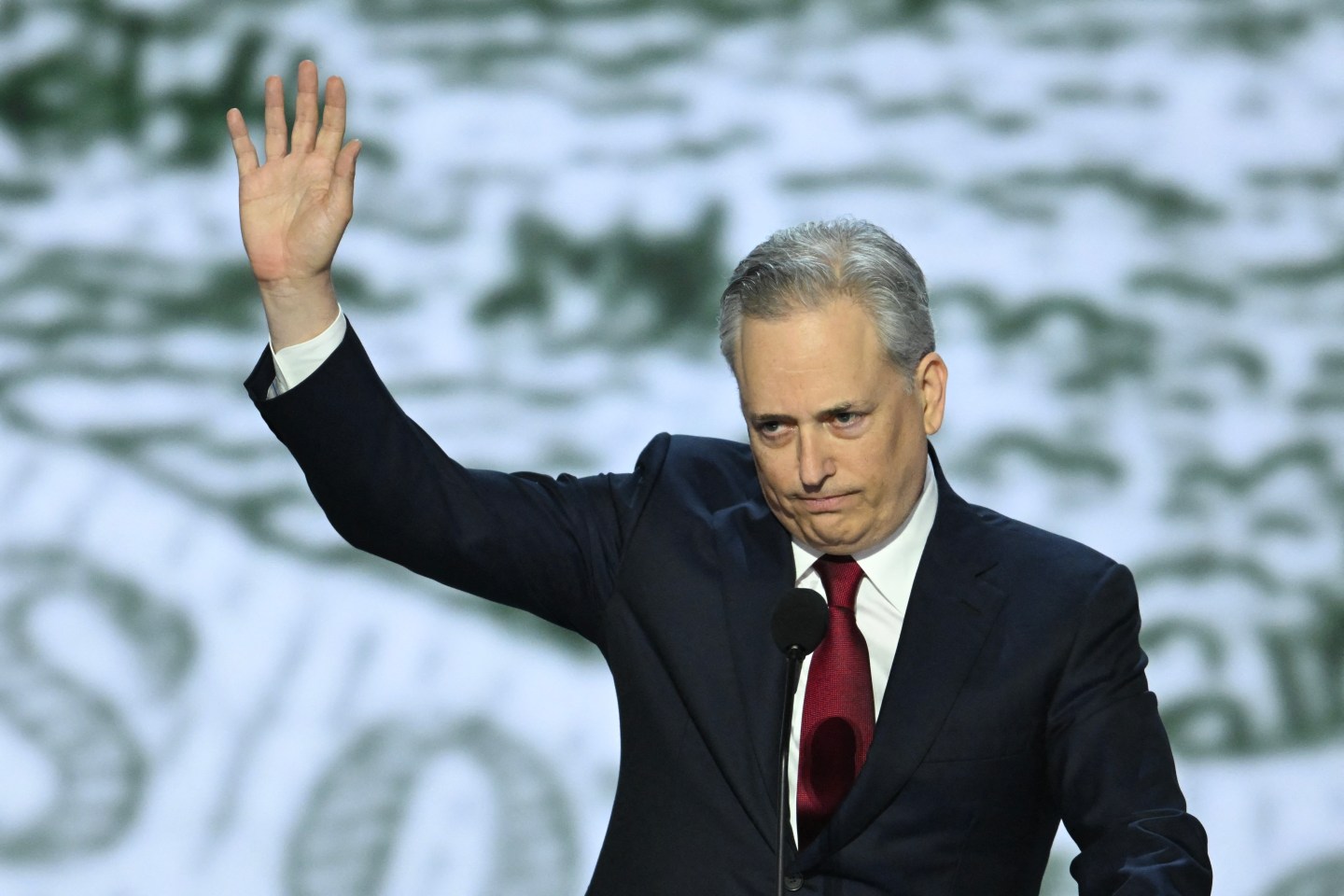Good morning. Holding out for new technology at work? Now’s the time, according to a new survey of CFOs: 66% say they plan to invest in tech in 2025.
Shocking, I know. But here’s the interesting bit: That figure is the highest it’s been in almost four years. The last time CFOs were feeling this good about tech spending, they were staring at an unending pandemic from the comfort of their home offices.
2025: The year of “innovate or die.” No pressure, folks. —Andrew Nusca
Want to send thoughts or suggestions to Data Sheet? Drop a line here.
Trump taps Sacks as AI and crypto czar, Slater as chief antitrust enforcer

Donald Trump said Thursday that he will choose venture capitalist David Sacks to serve as his artificial intelligence and crypto czar, a new position. Trump described it as focusing on “two areas critical to the future of American competitiveness.”
Sacks is one of Trump’s loudest Silicon Valley supporters, and not just because of his popular podcast All In. The Craft Ventures partner and onetime PayPal Mafia member—he was the company’s COO two decades ago—helped Trump fundraise among tech power players.
On crypto, Sacks will be expected to lead the industry deregulation that Trump promised on the campaign trail by creating a framework and serving as a liaison between the various agencies with jurisdiction over digital assets.
On AI, Sacks will be expected to influence how the federal government adopts and regulates the technology. He will undoubtedly work with fellow special government employee Elon Musk, another retired PayPal mafioso.
In addition to Sacks, Trump named the (hawkish) Gail Slater to replace the (also-hawkish) Jonathan Kanter as chief antitrust enforcer at the Department of Justice.
Slater has recently been advising incoming VP JD Vance on economic matters. Vance is really into tackling Big Tech's anticompetitive ways and has praised current Federal Trade Commission Chair Lina Khan, who has aggressively targeted Silicon Valley.
Slater spent a decade at the FTC—with which she will now regularly coordinate—and also worked at the Internet Association, a former Big Tech trade group. The lawyer will take over massive antitrust cases like that of Google, which Kanter and his team want to break up due to its monopolistic abuses in search.
As Reuters notes, it will also be up to Slater whether or not the DOJ continues investigating Nvidia over its dominance of the AI chip market. —AN and David Meyer
OpenAI debuts ChatGPT Pro
OpenAI said Thursday that it will introduce a higher-priced paid tier for ChatGPT that includes unlimited access to its most powerful artificial intelligence models, including o1 and GPT-4o.
The $200/month plan will also offer access to an expanded (read: faster, better) version of its o1 reasoning model that it previewed in September.
The moves come as OpenAI restructures to become a fully for-profit organization and pursues revenue. It’s no academic exercise: All those expenses for top-tier computing gear and leading minds led the company to record a reported $5 billion loss this past year.
OpenAI says it plans to announce more things “big and small” in the next two weeks. It will also demonstrate some of its latest capabilities at Fortune Brainstorm AI next week in San Francisco.
Waymo expands robotaxi fleet to Miami
Waymo said Thursday that it would bring driverless Jaguar vehicles to Miami as part of a broader expansion of its robotaxi service.
The Alphabet-owned company will begin testing vehicles in Florida’s most populous city next year and start charging for rides in 2026. Moove, which partners with Waymo in Phoenix, will manage the company’s vehicles in Miami.
Waymo’s two largest markets are Phoenix and San Francisco. A month ago, Waymo began offering service in an 80-square-mile portion of Los Angeles; it plans to launch service in Atlanta and Austin next year in partnership with Uber.
Waymo competes with GM-owned Cruise and will compete with Tesla’s eventual Cybercabs. It remains unprofitable, though its success in offering robotaxi service without any major traffic collisions, unlike rival Cruise, has helped it raise billions in funding from its parent company and others.
Elon Musk’s xAI has raised $6 billion
A new SEC filing reveals that Elon Musk’s rival to OpenAI and Anthropic successfully raised $6 billion from 97 investors.
The new funds brings xAI’s total raised to $12 billion—about $1 billion more than we wrote in this newsletter last month. At the time, various reports said the company was chasing a $50 billion valuation, double what it was earlier this year.
That’s particularly meaningful because Musk gave investors who funded his Twitter (now X) acquisition 25% of his xAI shares, according to a recent Financial Times report, allowing them a path to a return. (It’s a rarified list that includes Oracle co-founder Larry Ellison, Saudi Arabia’s Prince Alwaleed bin Talal, and VC firms Sequoia and Andreessen Horowitz.)
On what will xAI spend the cash? Like every other AI company, computing gear and talent. Various reports indicated the company had earmarked the funds for 100,000 Nvidia AI chips to expand its Colossus supercomputer in Memphis, which will reportedly also power Tesla’s self-driving features.
Meta to invest $10 billion in Louisiana data center
Facebook and Instagram parent Meta said this week that it will invest $10 billion to build out its largest-ever data center.
The facility would be located in Richland Paris in northern Louisiana, which is roughly equidistant from Jackson, Mississippi and Shreveport, Louisiana.
It would be dedicated to—what else?—processing AI workloads.
Renewable energy will support the amount of electricity used by the data center. Meta is working on the project with regional utility Entergy, which has two nuclear power plants in the state and recently received approval to invest in infrastructure to support an Amazon cloud facility in neighboring Mississippi.
Meta won’t finish building the facility until at least 2030. Work is expected to begin this month.
More data
—Intel adds Eric Meurice, Steve Sanghi to its board. One’s the former ASML CEO; the other’s Microchip’s interim CEO.
—Gitlab CEO Sid Sijbrandij steps down. The co-founder will focus on his cancer treatment; Bill Staples will step into the job.
—TSMC in talks to make Nvidia chips in Arizona. Nvidia’s Blackwell AI chips are currently made in Taiwan.
—AMP Robotics raises $91 million. The Colorado company uses tech to sort municipal solid waste.
—Jeff Bezos: Judge the wealthy by how rich they’ve made investors. Naturally, he ranks pretty high on his proposed list.













